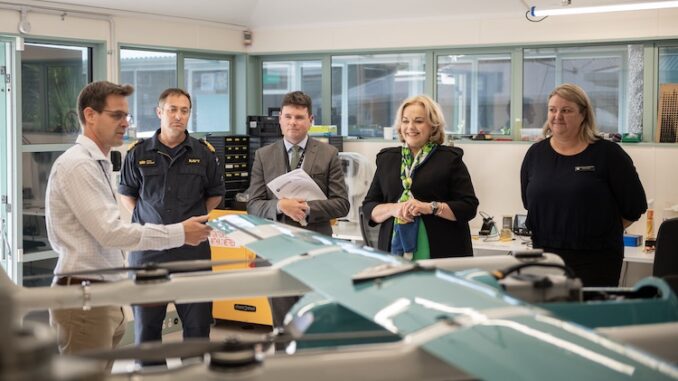
It is important that New Zealand remain a credible partner and ally to Australia through increased integration and interoperability and in the space sector, writes Defence Minister Hon Judith Collins KC.
New Zealand and Australia are great friends, the closest partners, and allies.
Forged on the battlefields of two world wars, the Anzac spirit is as strong as ever 110 years on. Just like their forebears, Kiwi soldiers today still stand side by side with their Australian counterparts on a wide range of operations overseas – from the recent coalition deployment to the Middle East to uphold maritime security in the Red Sea, to the Australian-led International Assistance Force mission in the Solomon Islands, and long-standing peace support operations in the Republic of Korea, Middle East and South Sudan.
Now more than ever, our bilateral relationship with our mates across the Tasman is of the utmost importance. The strong people to people connections the New Zealand Defence Force and Ministry of Defence have with their Australian counterparts are, I believe, critical to our country’s future.
Our Pacific neighbourhood is facing a more challenging strategic environment than for decades due to the impacts of geostrategic competition and climate change. As a consequence there are increasing threats to New Zealand’s security. The underlying liberal democratic principles that have brought relative peace since World War Two, are being tested by increased and increasing challenges to the rules-based system.
Read this article in the digital edition:
As a country that relies primarily on trade and travel in order to prosper, it is critical we do our bit to protect the global systems and principles that underpin the rules based system and that we benefit so greatly from.
We must make credible contributions to the stability and prosperity of our region, and to wider collective peace and security missions alongside our partners.
That is why I have made it my priority to ensure the enduring bond with Australia goes from strength to strength.
At the inaugural Australia-New Zealand combined Foreign and Defence Ministers meeting in Melbourne in February, Minister Peters and I agreed with our Australian counterparts that we are stronger when we work together. We believe it is critical that we build on our already rock-solid Anzac bond.
With that in mind, Ministers committed our militaries to increased integration and interoperability, including through common capability, the exchange of military personnel, and increased participation in joint warfighting exercises.
The Australia-New Zealand Ministers meeting also discussed the possibility of New Zealand’s participation in Pillar Two of AUKUS, a trilateral partnership between Australia, the United States and United Kingdom. New Zealand has welcomed Pillar Two and, like Australia, we believe it will make a significant contribution towards security and stability in the Indo-Pacific region.
In my conversations with Deputy Prime Minister and Defence Minister Richard Marles and Foreign Minister Penny Wong, we discussed what Pillar Two of the agreement could look like. It is early days for the Pillar but we know it will be focused on the development and sharing of advanced defence technologies.
I believe it is possible the hard-working and innovative Kiwis who work in the New Zealand Defence Force, and in the space, technology and academic sectors, could potentially contribute to the development of Pillar Two technologies with their scientific and technical knowledge.
Following the Australia-New Zealand Ministers meeting, Australian Defence officials have already flown to Wellington to brief officials on Pillar Two. I have also had discussions with the United States Secretary for State of Arms Control and International Security, Bonnie Jenkins, when she visited New Zealand. AUKUS partners are yet to put timeframes on when it will be opened up to new participants, but our understanding of the arrangement is growing with ongoing and regular discussions.
Another area where I believe it is very important that New Zealand remain a credible partner and ally to Australia is in the space sector.
New Zealand is one of only eleven countries worldwide with space launch facilities, and already it generates more than $1.7 billion a year in revenue, employs 5,000 people, and supports another 7,000 jobs.
Space related industries have the potential to grow the economy, support national security, and improve the lives of New Zealanders. They already enable innovation in fields as diverse as precision agriculture, financial transactions, and supply chain management.
As New Zealand’s first Minister for Space I am focused on ensuring New Zealand realises its potential as a space launch nation, including the benefits this offers to Australia. I am keenly aware that space technology developments have the potential to unleash innovation in the New Zealand Defence Force.
The Defence Force already conducts research into space operations, space surveillance and the use of space-based sensing. They are partnering with the University of Auckland to expand space-related research, including the use of artificial intelligence tools to improve search and rescue operations in the Pacific. It is likely that space-based technologies could significantly improve not only our maritime domain awareness, but the awareness for our Pacific partners too.
The Defence Force has several space initiatives currently underway with key international partners. Just last year, it joined the Joint Commercial Operations programme, which keeps track of objects in space in order to avoid collisions and build space domain awareness. Our small team leads the Pacific regional cell, which includes partners such as Australia.
Whether in our region or further abroad, we are stronger when we stand shoulder to shoulder with our only formal ally Australia and other partners. With many workstreams underway, watch this space for more initiatives that bolster the security of New Zealand, and that see our Defence Force work closely with partners in a meaningful way.









